Homes have risen 11.4% in price since the 2008 financial crisis. That means there are more potential commissions and revenue for you to obtain as a real estate agent.
However, getting qualified real estate leads is hard.
There’s tons of competition no matter where you’re located, and it’s a tough industry to break into as a beginner.
Even experienced agents can have trouble getting clients and end up in droughts.
And if you have no customers, you make no money.
That’s why today I’m going to teach you proven ways to generate real estate leads. Keep reading if you want to learn how.
Real estate prospecting
Have you ever performed cold calling before, and you had a knot in your throat every time you dialed a number?
Me, too.
Cold calling sucks, but I’d be lying if I said it wasn’t effective.
The thing is that most people do it wrong. They contact low quality leads, don’t have a script, and push too hard.
That’s why I suggest beginning with cold emailing instead. It’s less invasive for your leads, and it’s simpler to do at scale.
As well, email marketing can have a 4,400% return on investment when done correctly. That’s insane!

I’ve gotten most of my clients as a copywriter through cold email campaigns, so I’m going to show you how to do it effectively.
Build a hit list
No, not a hit list like you’re in the mafia, but a hit list of the best potential leads. You can break down your prospects into two categories:
- Real estate buyer leads: These are individuals looking to purchase a property.
- Real estate seller leads: These are individuals interesting in selling a property.
The best approach to get buyer leads is to purchase pre-existing lists from verified services. They grow their own database and share it with you, so you can begin getting real estate customers ASAP.
A quick Google search netted me a bunch of companies that offer leads for a fixed price.
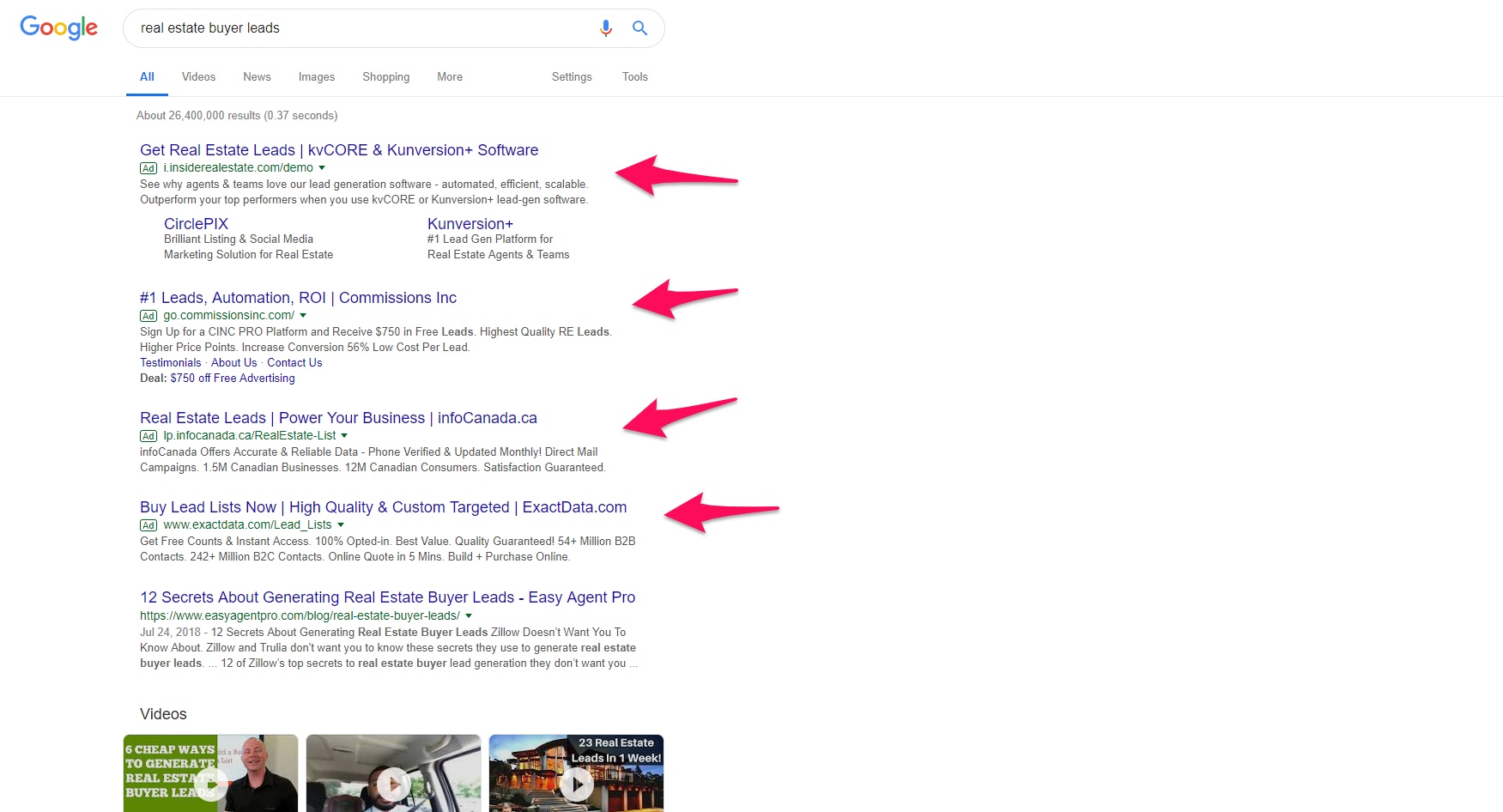
Imagine you paid $1,000 for a high quality list of leads, and it resulted in tens of thousands of dollars or more in commissions. It’s fair to say that your investment was well worth it.
That’s how you need to look at it, as an investment.
As they say, you can’t make money without spending money.
On the flip side, you can create a list of seller leads with a little research and elbow grease. Watch.
Let’s say that you want to find leads which are selling commercial properties and businesses. You can use a website like SellYourBusiness or filter any local real estate listing websites.
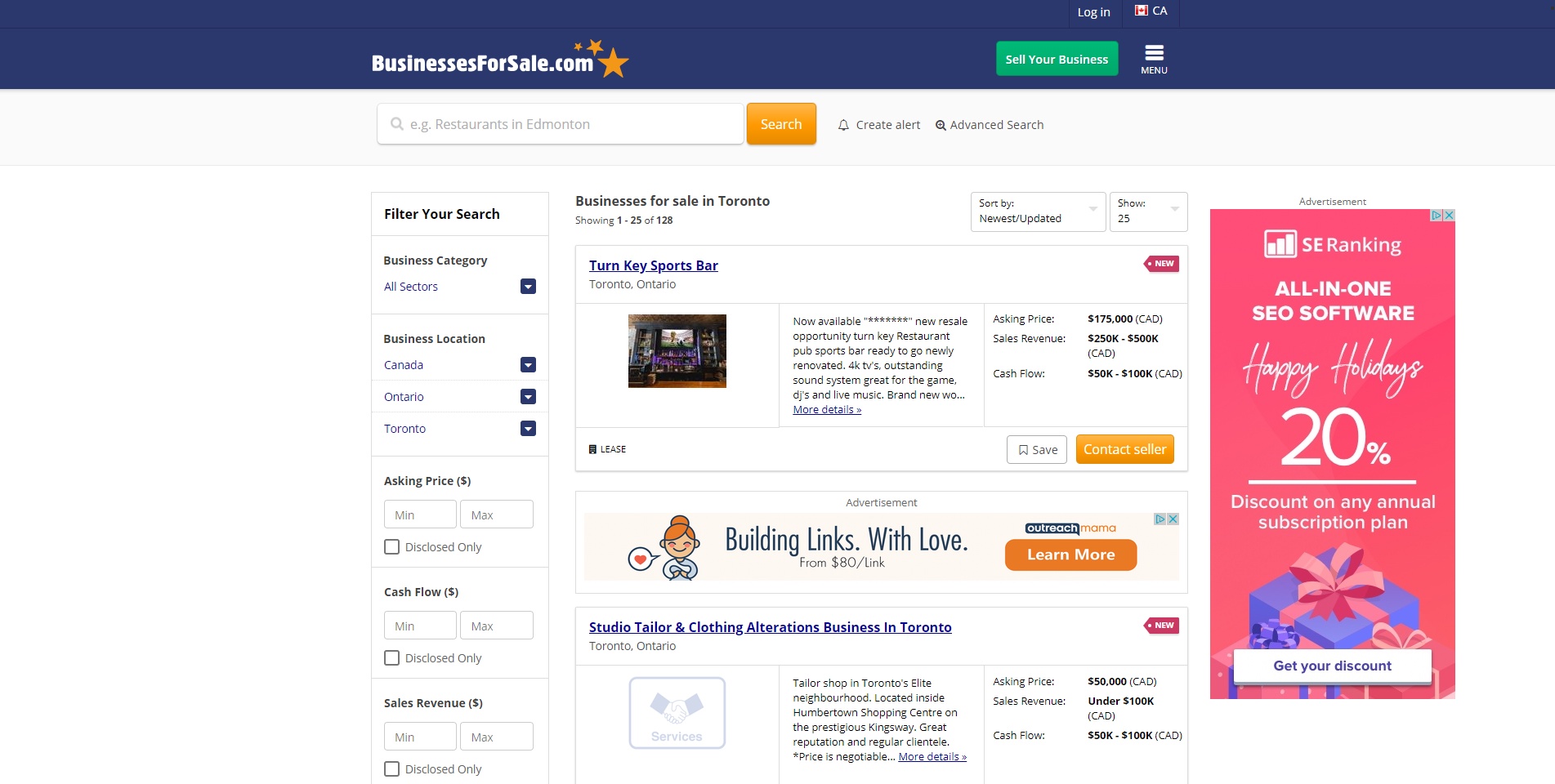
You first narrow down some properties that you want to target. I found a cleaning company that wants to sell its location, so I search for them on Google to find their website.
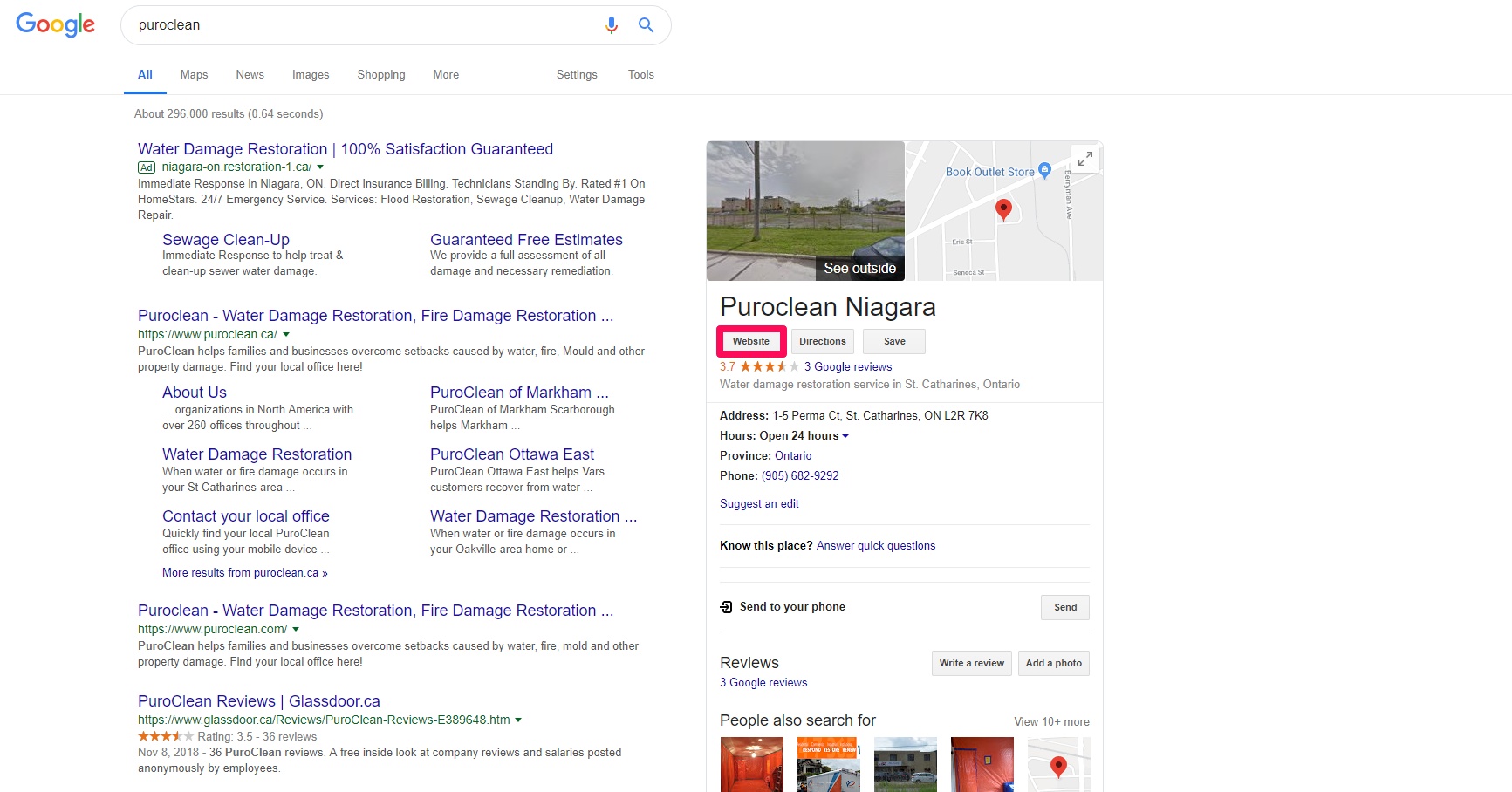
Upon visiting their website, I would look for their phone number or email. Better yet, I’d want to locate the specific branch they’re selling or a representative.
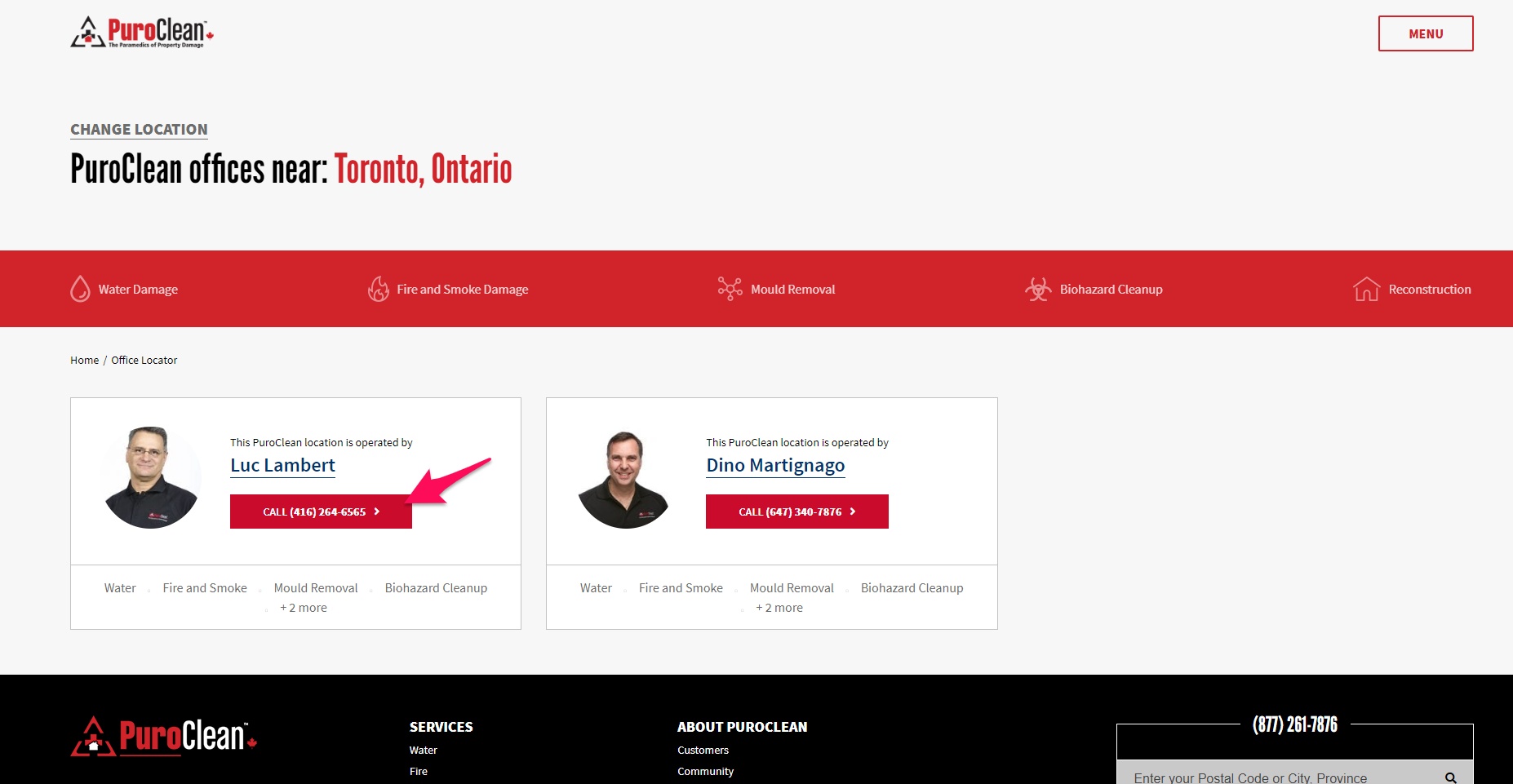
Bingo! I know we’re talking about cold emailing, but some times there will only be a phone number, so you’ll have to suck it up and ring them.
Read these cold calling tips to 10x your results if you have to pick up the phone, though.
You should be able to find emails this way, however. They’re usually in the footer of the website.
Check if they have a contact form, as well. It will normally include an email you can reach out with.
I highly suggest that you use a CRM to manage all of your contacts. Otherwise, it can get really messy and disorganized. If you’re serious about real estate lead generation, you need to treat it like a business.
Here are a few customer relationship management tools I recommend(that are free):
You want to set a goal every day. Maybe it’s collecting 25 leads. Maybe it’s 50. Maybe it’s 100. Start low and build from there.
Once you get a solid system down-pat, you’ll be flying through the process and getting non-stop clients.
If you’re enjoying this article, check out my mortgage marketing guide after as I think it will have a lot of strategies you won’t want to miss.
The next step is to email these prospects. Here’s how.
Cold emailing techniques and templates
It’s common for cold emails to only have a 1% conversion rate. That’s because most people suck at crafting an interesting email that entices a response.
Here’s how to write a cold email that will get you leads.
I get 90% open rates with my cold email campaigns and it’s practically free money at this point. Don’t you want that?
The subject line is like a first impression
Have you ever received an email and deleted it based on the subject line? You’re not alone. 47% of people open emails based on the subject line and nothing else.
That’s why it’s crucial you put effort into writing one that’s relevant and grabs attention.
I’ve had incredible success with these subject lines:
- “Quick question about {Company name}”
- “To {First name}”
Yeah, it’s that simple. Personalization is key. Include their personal or business name, and I guarantee it will have a good open rate.
One of my all-time best performing blog posts is How to Cold Email Clients [Land Clients Instantly] if you’d like to learn about cold emailing in-depth after, too.
Some other strategies include:
- Using urgency: No one wants to miss out on a good deal. Communicating that your lead has a great opportunity on their hands to buy or sell property in the subject line directly relates to their interests, while also promoting taking action.
- Curiosity: This can be a double edged sword, but when it works, it works well. Use a mysterious subject line that only tells half of the story. Something as simple as “Found Your Property Listing” is a great example. It doesn’t necessarily tell the recipient exactly what you’re implying, but it’s contextual and will peak their curiosity to open it.
- Benefit driven: What is the prospect going to get out of working with you? Will they save money? Will they sell or buy property faster and easier? Include the benefit in the subject line, and you should experience a better open rate.
With that out of the way, now it’s time to move onto the body of the mail.
Writing the meat and potatoes
The subject line is getting your foot in the door. Now it’s time to get them interested and on the phone, which happens in the body of the email.
These are some sales email templates from Hubspot that I recommend altering. The first of which involves offering help and making an observation.
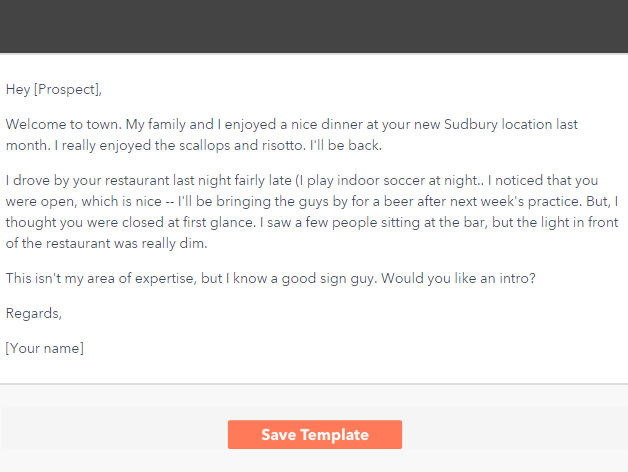
You could change this to say that you found their listing through a certain directory, word of mouth, or other sources. Then, you can talk about your expertise and ask if they require any help selling.
The next template is short and sweet. The strategy is to offer some form of useful insight. In your case, you could critique their real estate listing to help them improve it, for example.
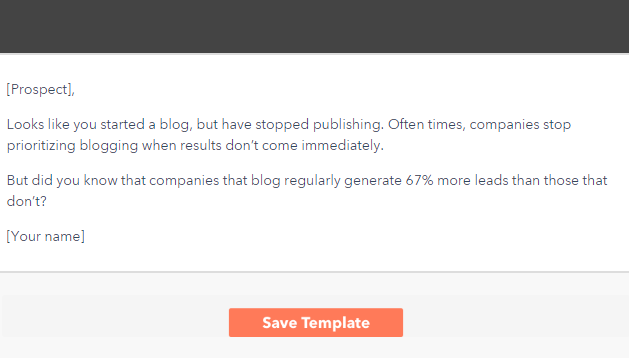
Lastly, this email template is all about finding the right person to speak with. After all, a customer service rep isn’t probably going to help much regarding selling a property.
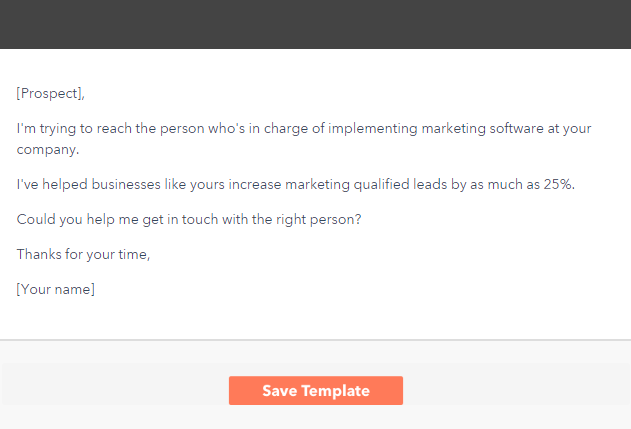
Ask if you could be forwarded to the right individual, but provide context.
If you don’t state that you’re a real estate agent, or the signature of your email doesn’t display so, they’re not going to understand what the inquiry is about.
Be annoying with follow ups
80% of sales require 5 follow-ups before making the deal. Are you one of the many entrepreneurs sending out a single email and quitting?
Don’t be one of them anymore.
Be annoying and continually follow up until you get an answer or a scheduled phone call.
Obviously, if they decline the offer, don’t keep emailing. That’s how you get a restraining order.
My follow-ups usually look like this:
Good morning,
I know you probably get a heap of emails every day, so I’m just following up to see if you could help me with this.
Warm regards,
Carmine
Yep, that’s all it takes. The goal of following up is to get back on their radar, as emails commonly get lost and forgotten.
I wrote an entire article on cold email follow-ups you need to read for maximizing follow-up ROI, as well.
Cold emailing should be the bread and butter of your real estate marketing plan, but here are more strategies you’d be crazy not to use.
Build partnerships with non-competing companies
Have you ever heard of a man named Jack Ma? How about the company Alibaba?
It’s one of the most successful e-commerce companies, with revenue close to $40 billion every year.
You’d expect Jack Ma, founder of Alibaba, to be ruthless, but he believes that competition is a good thing. You can learn from them, improve your own business, and build partnerships.
Every real estate agent should take notes and strive to build partnerships with other local companies.
If you contact other agents, they’re probably not going to be interested since you directly compete. So, instead, pitch companies that indirectly relate to being a real estate agent. Think:
- Contracting
- Construction
- Renovations
- Design and decor
They’re in the space, but you wouldn’t be taking each other’s customers. Win-win!
But, it needs to be mutual. You need to offer value or else the partnership is one-sided. So, how do you do that? There are two main ways:
- Help them get leads by referring people you know that would be interested in their services
- Give them a percentage of what you charge the lead they refer
The 411 business directory is a great spot to begin looking for partners. Search up keywords related to companies you’d like to pitch or choose from their many categories.
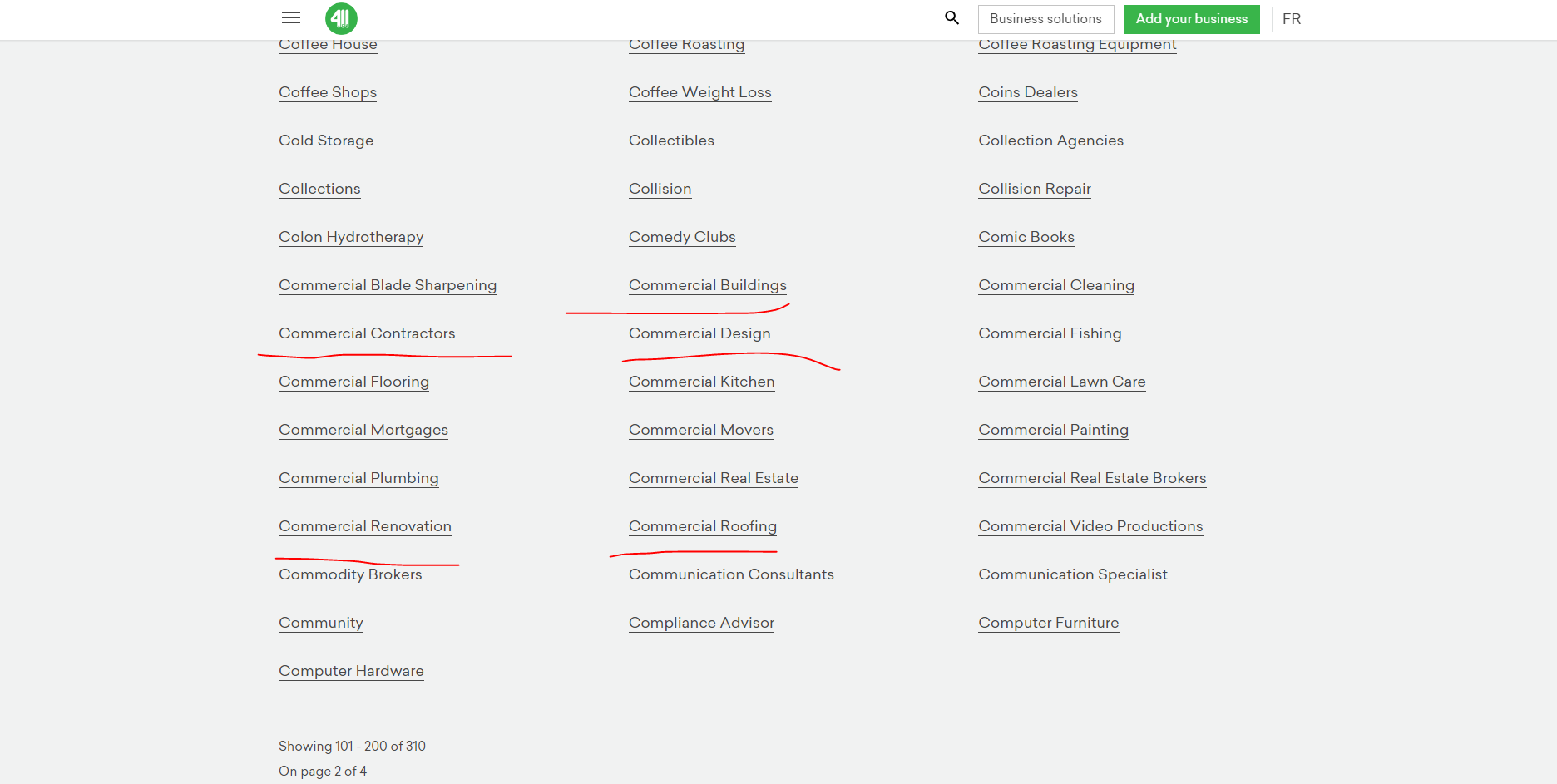
Go through the results and locate the website for any businesses that you’d like to pitch.
Just like you did with finding leads earlier, narrow down their email through the footer or contact page.
Plug this into your CRM or a spreadsheet.
Use this partnership email template from Art of Emails, and tailor it to your exact services.
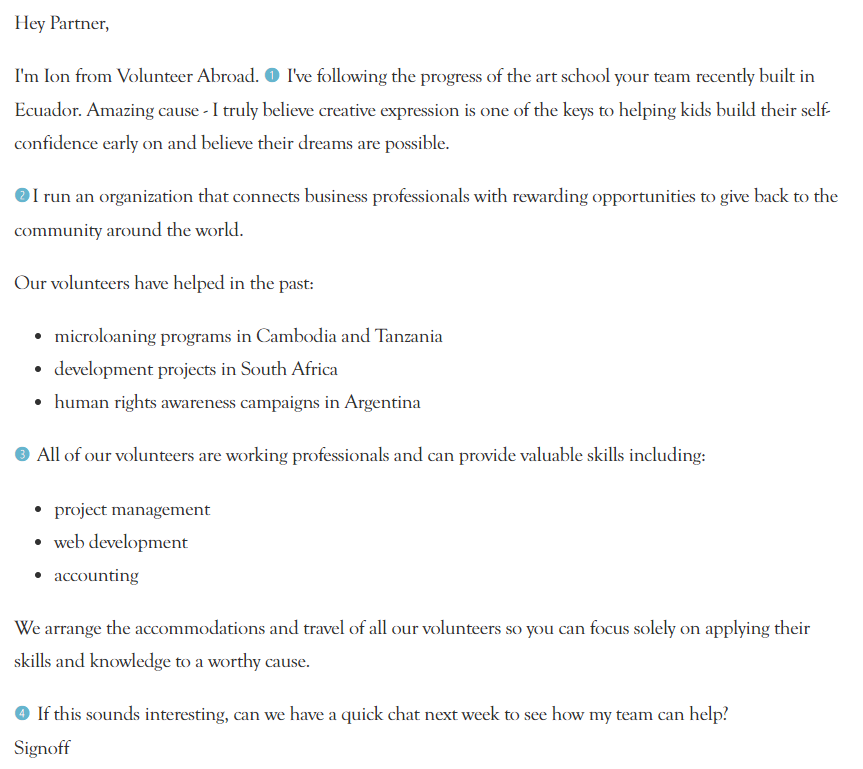
With these outbound tactics out of the way, let’s focus on some inbound strategies that will get you real estate clients passively.
Use YouTube to show off properties you’re selling
People don’t always have time to go visit houses they’re interested in. That’s where virtual tours come in handy, and YouTube is the best platform to do them.
Not only does it help you collect real estate buyer leads, but also creates a brand and capitalizes on content marketing. 60% of B2C marketers, like yourself, are committed to content marketing.
YouTube will drive traffic to your real estate website, listings, and other landing pages. This can also result in referrals and word of mouth spreading.
Check out this quick video on a property being sold in Veneto, Italy. Video allows potential buyers to see the house in detail, the surrounding area, and what life would be like in that location.
If you’re going to use YouTube for driving traffic to a landing page or similar web property, check out my real estate landing page guide to properly set one up to convert.
Optimize your social media accounts for local keywords
Leads from search engines have a closing rate of 14.6%. That means for every 100 users that find you organically, you could be generating at least one paying client.
That’s why mixing social media and SEO is one of the most effective ways for acquiring real estate leads for new agents.
You don’t need a high ranking website to get customers with SEO, either. Although you should have a website, you can optimize your social network profiles to attract real estate prospects. Here’s how.
Step 1: Research local real estate keywords
While you could probably guess local keywords, such as “Toronto real estate agent,” it’s best to use a tool to help you find the best possible ones.
Use the Wordtracker keyword tool by typing in a phrase and hitting the search button.
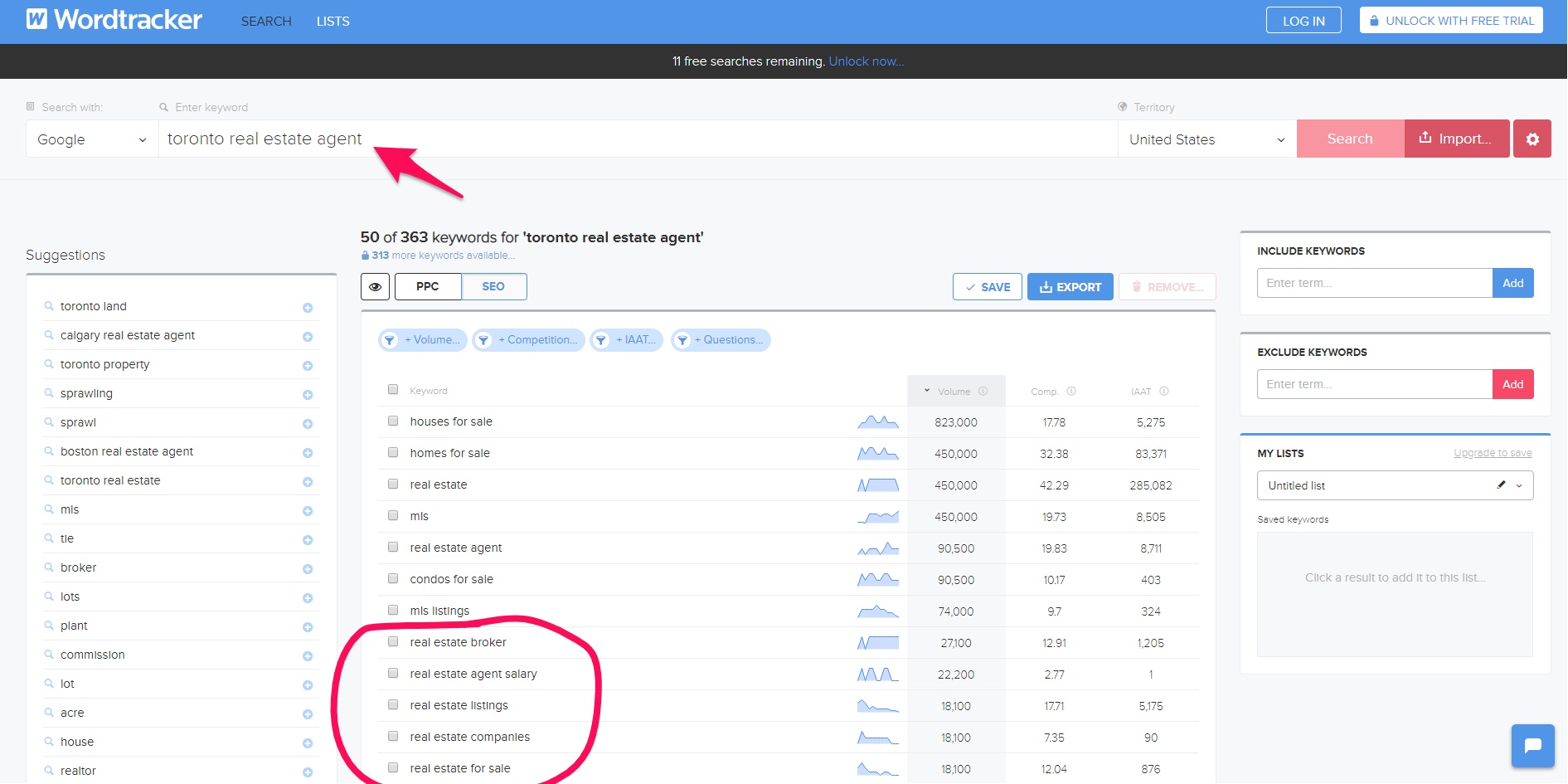
You don’t need many, so it’s best that you type out keywords you’d like to target into a text file.
Read my previous article on real estate marketing to learn more about real estate SEO, as well.
The main stat to pay attention to here is the search volume. The more, the better.
It’s also effective to target lower competition keywords that don’t have as many searches since they’re low hanging fruit. Let’s imagine the following scenario:
- You want to target “Toronto real estate agent” and it’s very high competition.
- You’d also like to rank for “GTA commercial properties.”
To get the best of both worlds, you could create a social media description along the lines of “Toronto real estate agent for 20 years that specializes in selling GTA commercial properties.”
You want it to sound natural and flow well. This brings me to my next point.
Step 2: Add the keywords into your social accounts
This is the easiest part, and the above example will lead you in the right direction.
You need to add the keywords you researched into the bio and other areas of your social profiles. This will change network to network, as every one is a bit different.
Here’s an example of a great real estate agent profile that includes a targeted keyword.
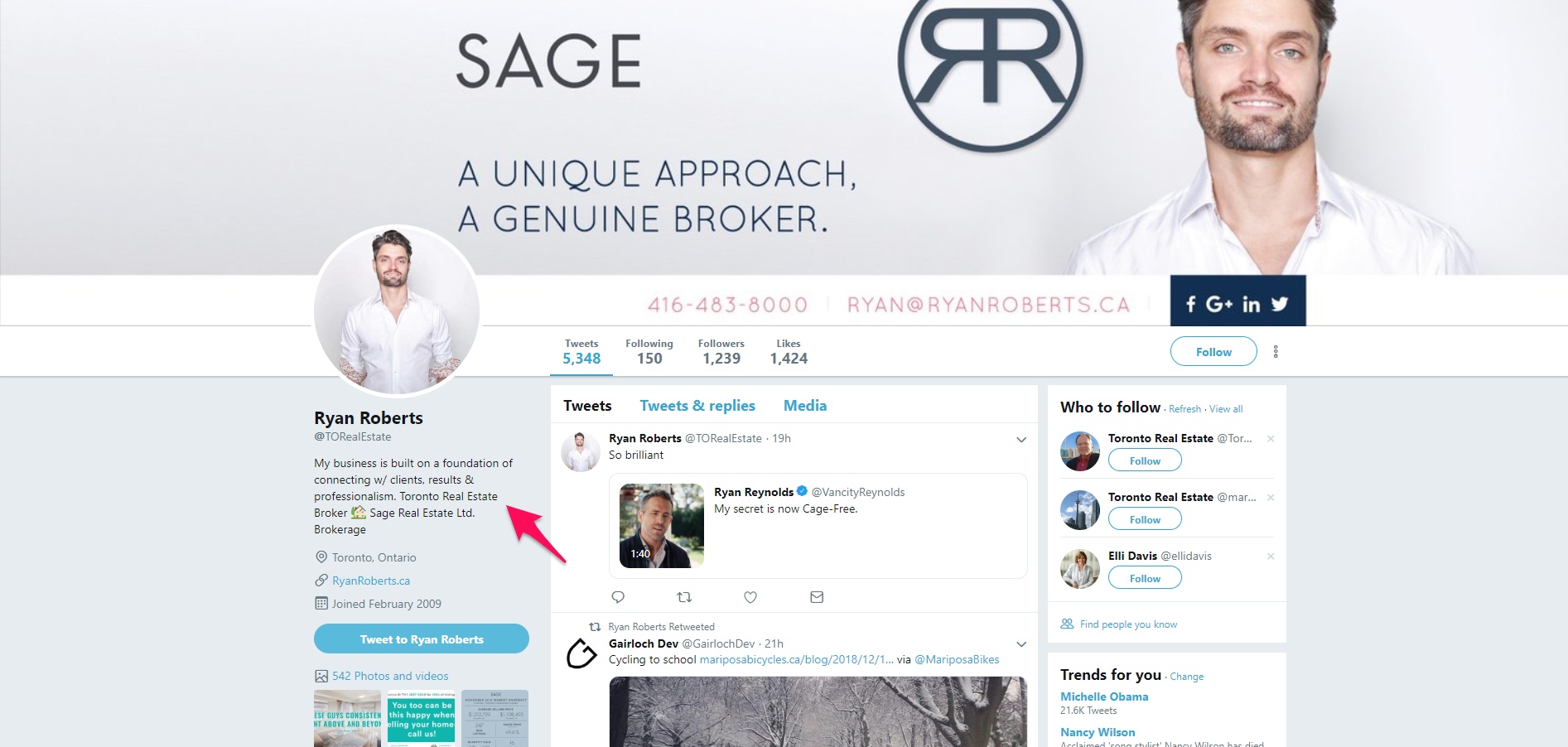
With 2.34 billion people on social media, you could easily be attracting leads to you passively with this strategy.
When users type in your chosen keywords, you will be one of the profiles that’s displayed. Furthermore, users will be able to find you through Google, too.
Scoop up local business citations
This is an easy win that every real estate agent needs to take.
It’s a quick approach to getting leads and traction, especially when you’re first beginning.
Local business citations are websites like Yelp, YellowPages, and 411. Once you’ve created your listing and it’s approved, it’s set-and-forget.
It will continue to drive business to you for years without the need to lift a finger. Here’s a list of 47 business citations you need to pick up:
- Google My Business
- Apple Maps
- Yellowpages
- 411
- Bing Places
- Yellowbook
- Infogroup
- Acxiom
- Factual
- LocalEze
- D&B
- Yelp
- Foursquare
- CityGrid
- Yahoo! Local
- MapQuest
- Superpages
- EZLocal
- Merchantcircle
- ChamberofCommerce
- Local.com
- BOTW
- Opendi
- HotFrog
- Brownbook
- InsiderPages
- Tupalo
- CitySquares
- n49
- GetFave
- 2FindLocal
- Here
- Angieslist
- BBB
- Thumbtack
- Infobel
- eLocal
- BizVotes
- Tuugo
- BizJournals
- B2BYellowpages
- ThreeBestRated
- MyHuckleberry
- SaleSpider
- ShowMeLocal
- Yasabe
Wrapping up
Getting exclusive real estate leads doesn’t have to be tough. It’s a competitive industry, but a mix of outbound and inbound strategies will have you swimming in clients.
The first step is to build an email list that you can prospect. Buying verified lists is the best way to begin, and can have an impressive ROI.
Commercial real estate leads can be found through business directories, where you locate their email and use a CRM for outreach. Make sure to follow up or you’ll be missing out on sales!
You can read my real estate content marketing guide for further information on these topics, too.
Next, focus on building partnerships with local companies that you don’t directly compete with. Contractors and construction businesses are popular choices. Offer value by referring them leads or a cut of what you make from their referrals.
When you list a property, record a video of the property and upload it to YouTube. Get permission from the owner of the property, of course, and use the address if possible. This will allow interested buyers to view the place before they invest in seeing it in person.
Similarly, optimize all of your social accounts with local real estate keywords. It can be placed in the bio of your account or the username if you want to step it up a notch. KWFinder, Ubersuggest, and Wordtracker are all great tools to achieve this.
Lastly, go claim all of your local business citations. These are super easy backlinks that empower your social profiles and website, while also driving organic leads to your inbox.
Enough reading, apply what you learned today and make some money!














